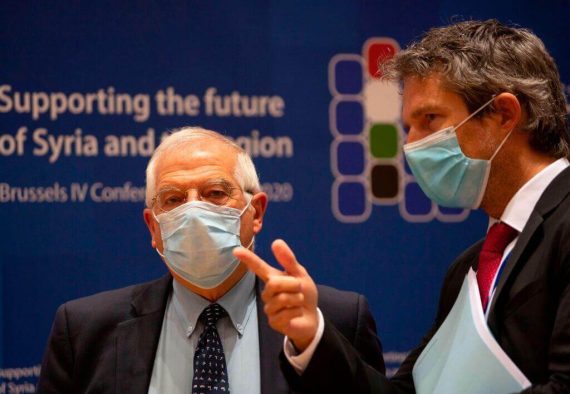Europe as a whole is not ready to normalize relations with Damascus, but some countries are exploring their options with their eyes closed.
A few European Union member states have mixed opinions about normalization with Bashar Alassad and their policies reflect that.
Denmark and Germany started sending refugees with criminal records back to Syria declaring that Damascus is a safe place to live.
But that may not be enough to meet the requirements of the Dublin Accords which protect refugees from being sent back to their home countries if they face possible detention or revenge attacks because of their political views.
Even though discussion about normalization with Alassad has become a geopolitical trend, the reality is that the situation in Syria is unstable and unpredictable.
European countries, along with the United States, and a long list of Arab countries, are unable to solve the huge humanitarian crisis in Syria, and some would rather revert to the pre 2011 revolution status quo.
Hundreds of thousands of Syrians amassed on European borders.
The most prominent example of this policy was the European migration deal struck with Turkey in 2016. Europe offered Turkey monetary incentives to prevent the massive flow of migrants across land and sea towards Europe. At the time, hundreds of thousands of Syrians amassed on European borders and lined back roads and footpaths across the European continent with hopes of starting new lives.
They were escaping a Syria that was in decline but already unlivable in many ways.
Even before the revolution individual rights were heavily restricted, free market conditions were abhorrent, opportunities for youth were limited, long droughts negatively impacted agricultural production, intelligence agencies were loyal to the Alassad family, and the dictatorial tendencies of Bashar Alassad were no mystery to Syrians inside and outside the country.
More than a decade of revolution, mass displacement, and war brought the country into even further demise making pre revolution conditions seem appealing.
But some European countries are being deceived.
The reason thousands of Syrians risked their lives to reach Europe was to flee Bashar Alassad’s wrath. The weapons Alassad family used against the Syrian people are many and the Syrians know how creative Syria’s intelligence and security agencies can be.
When the Daesh terror group appeared in Syria, Europeans were afraid that the calls for a Caliphate would mobilize large European Muslim populations at home or Europeans that travelled to join the group would return with marching orders and resources. European countries privately mulled the idea that they needed Bashar Alassad’s cooperation to prevent the threat from reaching their borders.
Many countries conveniently ignored the fact that the Daesh terror group was coordinating directly with Bashar Alassad’s intelligence agencies and many of the members, including mid to top level leaders, were released from Syrian prisons only to directly join the terror group. This was a major turning point in the progression of the revolution, since the regime was able to convince European countries that the revolution was actually a threat to them because Daesh represented the kinds of ideas that the antigovernment protesters carried.
It was Alassad’s intention to force Europe’s hand using the fear card from the very beginning of the revolution. Recently forced into retirement, then Grand Mufti of Syria Ahmed Bedreddin Hassoun, threatened to send suicide bombers to Europe in 2011 if western countries intervened in Syria.
Years later, multiple Daesh inspired terror attacks took place across Europe. Then in 2018, German parliament members of the far-right political party, Alternative for Germany, visited Damascus, and met with many people including Hassoun. They wanted to find a way to send Syrians back and they needed to declare the country safe.
Despite mounting evidence of human rights violations going back decades, some European countries are more comfortable looking the other way.
The most recent evidence of Europe turning a blind eye to the horrors of Alassad family is the return of Bashar’s estranged uncle Rifaat.
Rifaat was exiled from Syria by his brother Hafez, Bashar’s father, in 1984. While in Europe, Rifaat embezzled money and was investigated in both Spain and France for related violations. But his criminal record began years before he went to Europe.
Rifaat Alassad worked hand in hand with his brother Hafez to conduct the coup that put Alassad family in power and according to most informed sources directly oversaw what is now known as the “Hama massacre”.
Recommended
In 1982, Rifaat Alassad, or the “Butcher of Hama”, was the commanding General who carried out the siege of Hama where according to some estimates up to 40,000 people were killed. The military operation put to an end a religiously motivated political uprising that started in 1976 by the Muslim Brotherhood. Two years later, Rifaat failed to overthrow his brother Hafez and went into exile, settling in France.
Rifaat Alassad recently escaped France on a private jet avoiding a four-year jail sentence for embezzlement but more importantly he was also able to escape possible prosecution resulting from an ongoing investigation in Switzerland about his role in committing possible war crimes in Hama.
Some European countries are using normalization with Alassad to put pressure on Turkey, especially Greek Cyprus and Greece.
It remains a mystery how Rifaat was able to flee France unhindered and why Swiss authorities were unable to impress upon the French the severity of the allegations against him. For Rifaat, Bashar, and Europe – the uncle’s return to Syria carries significant implications.
Bashar allowed his uncle to return to build comradery with the Alawite community which holds Rifaat in high regard and have grown frustrated with Bashar. Using his uncle as a counterbalance to his cousin Rami Makhlouf who spent the past two years pleading with Bashar via social media to stop expropriating his personal assets.
But more importantly for Bashar, he wanted to prevent his uncle from cooperating with European authorities revealing family secrets implicating Bashar, his narco-trafficking kingpin brother Maher Alassad, or others, in a long list of crimes, both past and present.
While some European countries are happy to see Alassad family consolidate its criminal enterprises and reign in the vast network of beneficiaries relieving Europe from having to face off with the mafia-like family in European court rooms; other European countries are using normalization with Alassad to put pressure on Turkey, especially Greek Cyprus and Greece.

VIDEO: SYRIA: Can the EU make a difference?
Greece and Cyprus have taken a pro Alassad stance to disturb Turkey which has expanded its geopolitical prowess not only in Syria but across the region. The two countries have established relations with Alassad and allow Syrians from areas under Alassad’s control to conduct business and travel freely. They’ve also given safe haven to members of terror groups that pose a threat to Turkey, namely the PKK and DHKPC. The countries are also appealing to European countries that want to deport Syrians, because Greece and Cyprus would be more willing to facilitate the deportees’ transit to Syria despite the questionable nature of the forced deportations.
The European Union’s official position is that it will not recognize the government in Damascus until necessary political reforms are made. But individual European countries are exploring how they can manage a relationship with Damascus to achieve specific strategic, geopolitical, financial, and security goals. The ripple effect of Syria’s long-term conflict is proving to be quite turbulent directly impacting Europe on multiple fronts. European countries know Alassad family well and realize they may be dealing with them as the de facto power broker in Damascus for the time being.
What Europe fails to realize is that a lack of accountability has allowed Bashar to sharpen his teeth and become a part of a widespread criminal enterprise that engages in drug smuggling, money laundering, arms sales, torture, illegal imprisonment, extortion, and assassinations that operates with impunity across multiple continents. Europe will not be safe if it continues to avoid addressing the source of this threat. If Europe adopts an official normalization position, Bashar will be the winner and Europe will be next in line on his chopping block.





